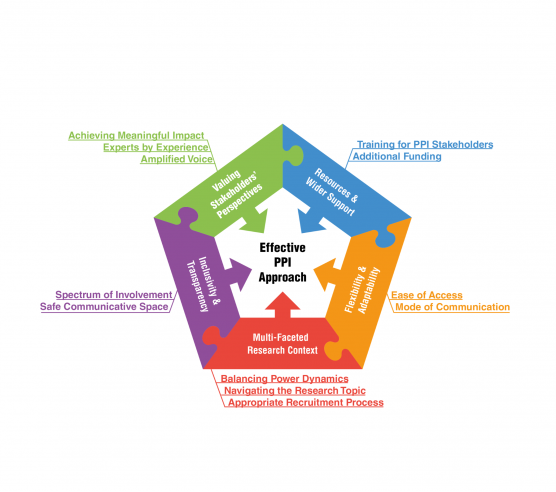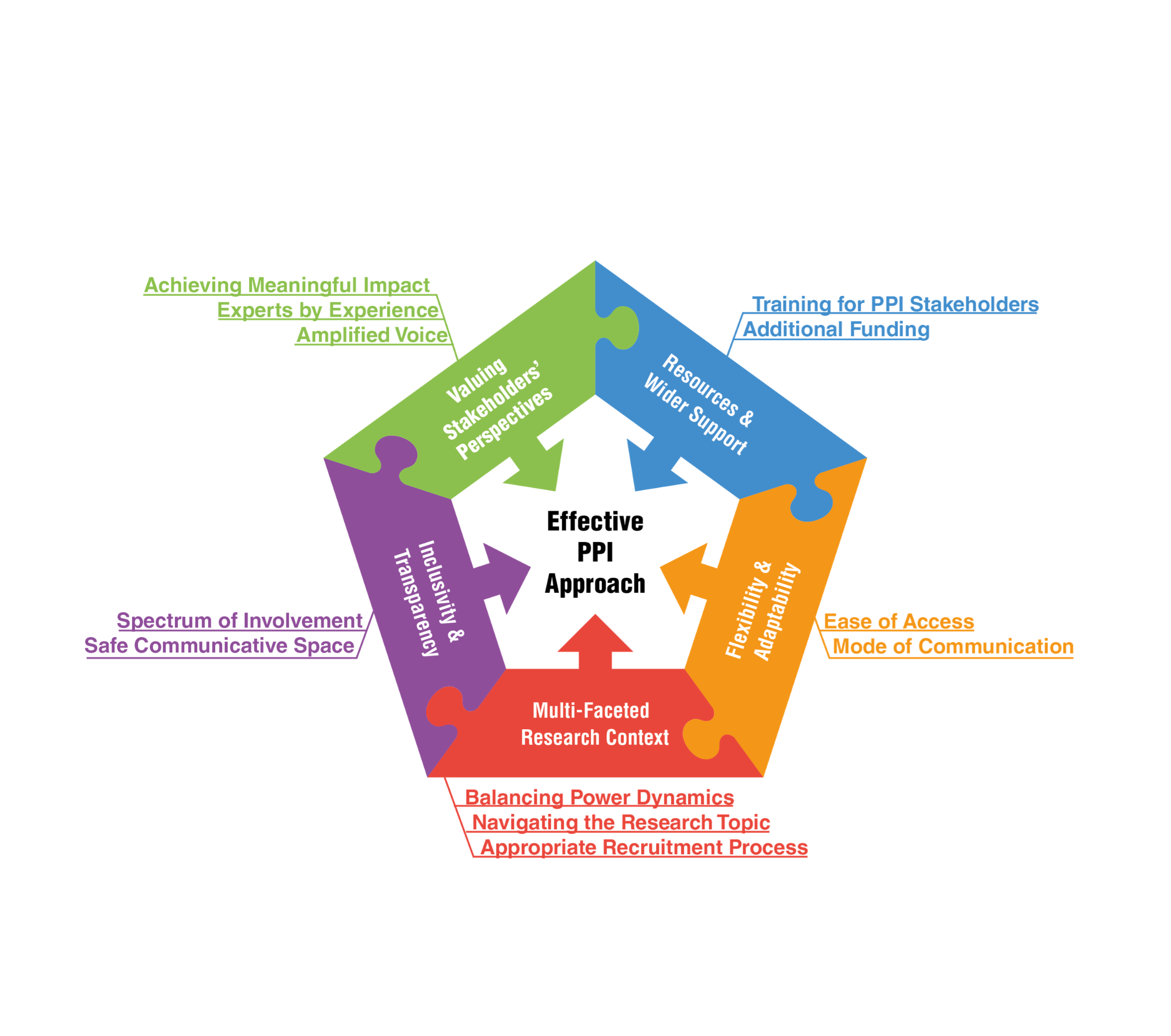Inclusive Opportunities: What Is Effective Public Involvement In Care Home Research?
10 July 2023
My journey into research
As a final year medical student, I have witnessed my growth from being a layperson reading peer-reviewed articles to becoming a published author. This systematic review began in September 2021 as the dissertation for my intercalated BSc degree in Population Medicine which was supervised by Dr Shepherd and Dr Nollett who are experts in public involvement innovation. My journey into research as a first author has been refreshing and uplifting, beginning this project two years ago with minimal exposure to public health and care home research as well as limited experience navigating journal submissions to becoming a valued member of the research team. My growth in this project is more than just coincidence!
This blog gives an outline of the key findings of our study which highlight effective approaches to public involvement in care home research. Our study identifies the value of incorporating the lived experiences of care home residents, care home staff and their families to co-produce research that is relevant and specific to their needs.
What is public involvement in research?
Public involvement in research provides an avenue for underrepresented individuals who are often solely participants of research to become designers and developers of research. An approach which unifies varied perspectives and lived experiences of laypeople alongside the scientific knowledge of academic researchers. This integration and partnership with different stakeholders enable non-academics to conduct research, steer the conceptualisation of study aims with the research team and aid the dissemination of outcomes.
Researchers are often given a stereotype of being academics with vast expertise who investigate a population group to answer specific questions and hypotheses. Opposingly, public involvement in research challenges this narrative by empowering the opinions and values of these investigated populations who are usually classified as users of research to co-design and co-produce research that is relevant and person-centred.
Public involvement in care home research
This evolving research landscape is pertinent for care home residents and marginalised groups whose engagement in research is frequently limited to completing surveys, attending interviews and testing the efficacy of new devices. Importantly, public involvement in care home research challenges the norm and instead incorporates the ideas and insights of care home residents to help design surveys, propose questions for interviews and workshops and suggest key features for new devices and facilities.
Unfortunately, the complexities of involving care home residents and people with physical and cognitive impairments due to additional care and communication needs acts as a hindrance to diversify the role of the researcher. Consequently, research for this underrepresented population is generalised and non-specific; as care home residents, care home staff and relatives are often overpowered and undervalued within the research team due to preconceived ideas and misconceptions. However, research has shown, including these important stakeholders as valuable members of the research team will empower and allow authentic experiences to shape and direct research.
What did we do?

In this systematic review we looked at twenty-seven studies using different approaches to public involvement in care home research which were sourced from electronic databases, web-searches and topic-specific journals. Studies were included if they were in the English language and reported public involvement research in care homes, residential homes, or nursing homes regardless of the care home population (older people or younger adults with disabilities) or research topic. Whilst studies were excluded if this eligibility guide was not met.
Following this, data extraction was conducted by the research team to encapsulate the key emerging concepts that were apparent across all the twenty-seven studies. During synthesis of this data, it was concluded that effective approaches to public involvement in care home research can be grouped into five themes: valuing stakeholders’ perspectives; ensuring inclusivity and transparency; awareness of the multi-faceted research context; maintaining flexibility and adaptability and utilising resources and wider support.
Our Findings
The reporting quality and study set-up of public involvement in care home research was variable; some articles described what methods of public involvement had taken place, whilst others explained how effective their approach to involvement had been and why. Additionally, we found that studies involved different combinations of residents, families, and staff depending on the type of study and what was involved.
For involvement to be effective, it was important that researchers valued differing perspectives by providing a safe forum for stakeholders to share their opinions. Researchers should also understand that successful involvement requires flexibility and adaptability to accommodate the varied needs of individuals such as time commitments and simplifying the complexities of the research terminology. Additionally, researchers should utilise the wide range of available resources and support to ensure under-served groups are appropriately included within the research team.
What next?
We concluded that public involvement in care home research needs to focus on the needs of the individuals to ensure that people with physical and cognitive impairments can be involved. The findings can help care home researchers to create equal opportunities for all to be involved.
Call to Action
My journey into research from a layperson to first author emphasises the importance of challenging the stereotypes of the ‘eligible researcher’ to truly unravel preconceived ideas of inclusivity and engagement to ensure underrepresented groups can voice their lived experiences and increase the applicability of research findings.
To my fellow researchers and academics, it is our duty to transform the rigid and hierarchical research culture where academic experience often dominates. Rather, it is our hope that our model of an effective approach to public involvement in research enables those who are deemed to have passive voices to become owners of research with active and valuable participation in the creation of knowledge.
We look forward to creating a research environment that is representative and accessible to under-served groups regardless of age, experience, or health status.
Read & Share
The full report has been published in the BMC journal Research Involvement and Engagement and can be accessed here: https://doi-org.abc.cardiff.ac.uk/10.1186/s40900-023-00453-2
Brief Biography of Authors
The Research Team: Tanisha Burgher, Dr Victoria Shepherd, Dr Claire Nollett
Tanisha Burgher is a final-year medical student at Cardiff University who will be graduating as a medical doctor in July 2023. This systematic review was completed during her intercalated BSc degree in Population Medicine at Cardiff University. Due to outstanding achievement in this degree, she was awarded the Nigel Stott prize at Cardiff University and highest grade in her cohort. She has a budding interest in public involvement in research and hopes the past two years of research experience will give her the momentum to impact even greater change.
Dr Victoria Shepherd and Dr Claire Nollett are experts in public involvement in health and care research with several research publications tailored to advance practice and understanding in public involvement innovation.
- December 2025
- October 2025
- June 2025
- May 2025
- April 2025
- March 2025
- February 2025
- December 2024
- November 2024
- October 2024
- September 2024
- July 2024
- June 2024
- May 2024
- April 2024
- March 2024
- December 2023
- November 2023
- September 2023
- July 2023
- June 2023
- April 2023
- March 2023
- February 2023
- December 2022
- November 2022
- October 2022
- September 2022
- August 2022
- July 2022
- June 2022
- May 2022
- April 2022
- March 2022
- February 2022
- January 2022
- November 2021
- September 2021
- July 2021
- June 2021
- May 2021
- March 2021
- February 2021
- December 2020
- November 2020
- September 2020
- August 2020
- July 2020
- January 2020
- December 2019
- October 2019
- September 2019
- July 2019
- June 2019
- May 2019
- April 2019
- February 2019
- December 2018
- November 2018
- October 2018
- September 2018
- August 2018
- July 2018
- June 2018
- May 2018
- April 2018
- March 2018
- December 2017
- October 2017
- August 2017
- July 2017
- June 2017
- May 2017
- April 2017
- March 2017
- February 2017
- January 2017
- December 2016
- October 2016
- August 2016
- June 2016
- April 2016
- March 2016
- February 2016